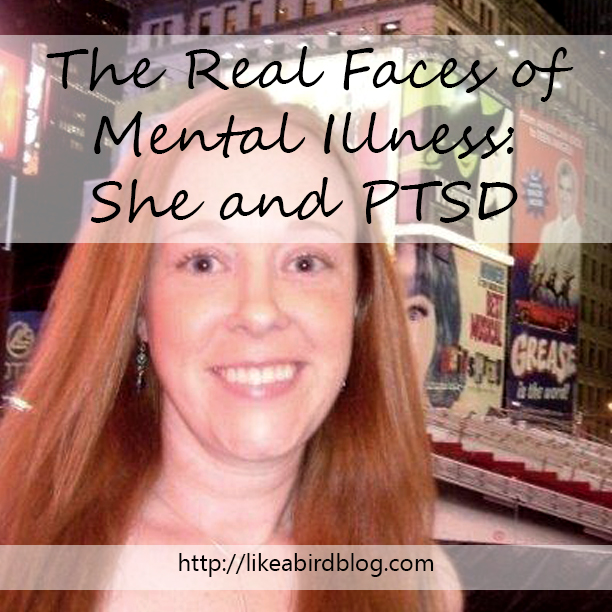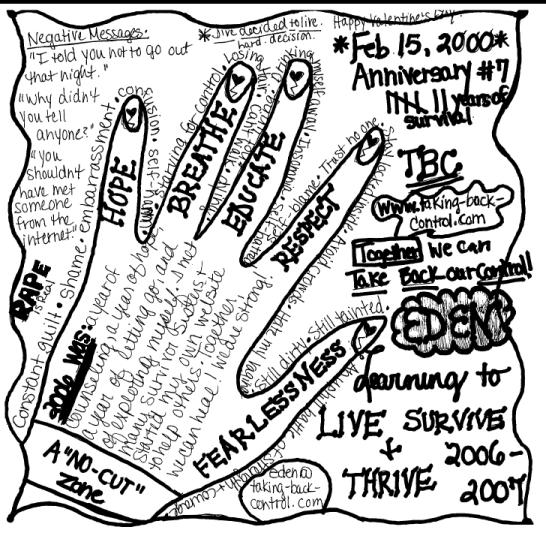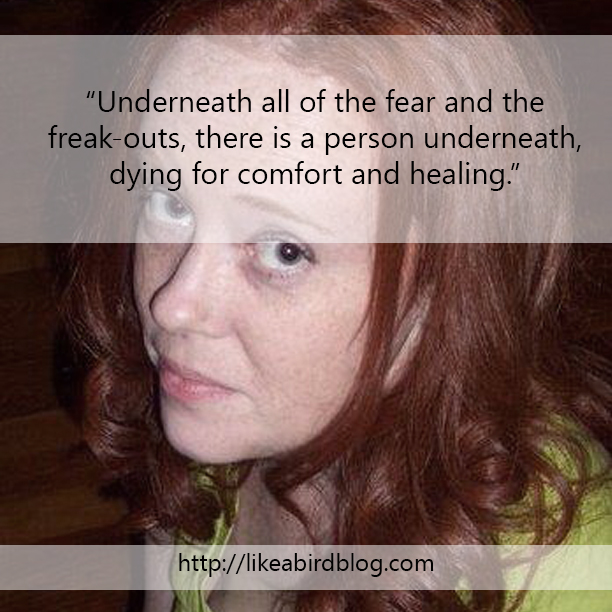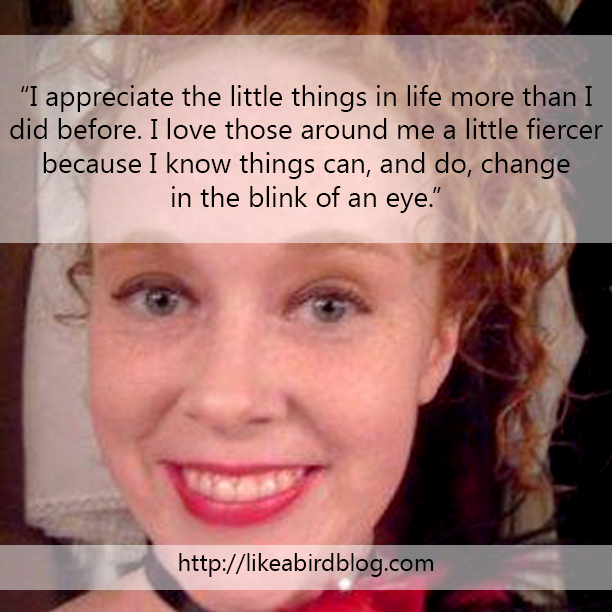The Real Faces of Mental Illness is a monthly interview series from real people sharing their personal stories and experiences. I want to show people what it’s really like to have a mental illness and not hide behind medical terms and symptoms. I want to share what it’s like to live with these diseases, on a day to day basis and how it really looks and feels and what recovery really involves. I want to share the real face of mental illnesses.

Can you tell us a bit about yourself? (name, age, job, hobbies etc)
My online name is She and I’m a 36-year-old from Ohio, USA. I sell insurance with my Musical Theatre degree. By night, I’m a singer, dancer, actor, choreographer and writer. In my spare time, I run an Etsy shop, making Disney Autograph Books and Journals. I also design and make jewelry for my jewelry shop. Both are currently on hiatus, however, as I’m choosing to focus currently on my mental health. You can find me blogging about my struggles.
Mental health wise, I am Bipolar II, although more on the depressive side, with some OCD thrown in for good measure. I acquired the PTSD diagnosis after being sexually assaulted by one person and stalked and assaulted by another.
For those who don’t know, what is Post Traumatic Stress Disorder?
Per Wikipedia, “(PTSD) is an anxiety disorder that may develop after a person is exposed to one or more traumatic events, such as sexual assault, serious injury or the threat of death.”
In plain speak, PTSD occurs when the mind gets stuck in a “flight, fight of freeze” pattern after a traumatizing event. Your brain chemistry is physically altered. A traumatized mind thinks that you are in constant combat and your brain behaves as thus. You are prone to having flashbacks, nightmares, amnesia, emotional numbing or hyper vigilance.
What does PTSD feel like for you?
PTSD in its infancy meant flashbacks, pacing around rooms, running away from any perceived threatening situation, insomnia, panic, and zoning out and dissociating from any situation I couldn’t run from. I became anorexic and cut myself during the early years.
After spending years in counseling, PTSD now means little flare-ups here and there when I am triggered by something from the past. I’m currently experiencing a flare-up due to the anniversary of my first assault occurring in two weeks, on February 15. It’s manifesting in not being able to deal with small situations, blowing things out of proportion, and feeling very angry.
There are 2 poems further down in the interview.
Below is some artwork.

What do you wish people knew about PTSD?
A person is not their PTSD. Underneath all of the fear and the freak-outs, there is a person underneath, dying for comfort and healing. Reach out to that person. Allow them to “be” and let them know you are there if they need to talk or just want company.

Have you been officially diagnosed by a doctor? If yes. what symptoms or events in your life led you to being tested? How has the official diagnoses affected your outlook on yourself, and your treatment?
I have been officially diagnosed with PTSD. For the 6 years after my assaults, I had no idea what was wrong with me. I had what I called “freak-outs” all the time, was terrified of everything, cried at the drop of a hat, etc. I had no control over my emotions. It wasn’t until I finally went to counseling and was diagnosed with PTSD that everything started to make sense. I wasn’t crazy. There was an actual name for what I had. Having a diagnoses was a relief. Knowing that, although my brain chemistry had changed because of what I went through, I could change it back was a relief!
My symptoms at the time of diagnosis were:
Having flashbacks (reliving the event)
Lack of concentration
Zoning out/numbing out
Being on high alert
Big startle response
Staying away from crowds/situations where I could be attacked again
To fight for control, I was:
Starving myself, trying to make myself disappear
Cutting myself
Berating myself for what a horrible person I was all the time
Have you sought treatment? Are you currently in therapy or on medication? How does that help your illness and day to day life?
Although I’ve been on anti-depressants since age 19 for my depression, I didn’t seek treatment for my PTSD until 2006, 6 years after my assaults. The catalyst for this was that I found my 1st rapist and had an email discussion with him. He admitted what he’d done to me, and although that was what I thought I wanted to hear, I completely shut down after that conversation. I had no feelings whatsoever. I knew something was terribly wrong inside me and that things were only going to get worse if I didn’t get help. I called a rape hotline and was set up with free trauma counseling in my town. It was that help that truly saved my life.
8 years later, I continue what I call “maintenance” counseling. I go every other week, and it’s a way to keep my traumas in-check.
There is no medication per se that you can take to help your PTSD, but a psychiatrist can prescribe you some anti-anxiety medication that helps. If you choose to go the sans medication route, definitely find a counselor and learn some positive coping techniques. Those can be a real lifesaver.
What Have I Learned?
by She 5/15/02
I’ve learned that love is never enough
That the past leaves gnarly roots, just dying to break through the surface,
That sometimes it takes a broken heart to snap you out of your stupor,
That falling in love can be scarier than death for some,
That sobbing is stronger than tears,
That salt deposits on your glasses can become normal,
That starving yourself can feel liberating,
That seeing your ribs can make you smile,
That cutting your arms can ease the fire inside,
That you can’t make someone love you,
That you can’t make someone show you they love you,
That actions still speak louder than words,
That happiness comes from within,
That you can’t base your self-worth on the way others treat you,
That your heart can shatter into 85 million pieces,
That you can find someone that fits with you, spiritually, emotionally, & physically,
But who can’t handle falling in love with you,
That would rather immerse himself in a younger girl to feel safer,
Whose voice can still activate the butterflies within you,
Who you wish was holding you on this, the day you were raped,
The day you were lured, and drugged, and held down, and violated,
And left to shudder in secret,
And lie to those around you, by not telling them what happened,
By taking extra-long showers, and getting trashed every night,
And being confused as to why you would sleep with someone who is not your boyfriend,
And weep behind closed doors, on bathroom floors, and in the car,
To tell him in an email why you don’t want to be touched,
To constantly feel guilty for everything that happens around you,
To apologize before a crime has been committed,
To bury your anger for almost 2 years,
Before someone breaks your heart and sets you into a fury,
That turns into hate and rage for the guy that lured you, drugged you, raped you twice . . .
Some look at you with pity, others as though you are insane.
Some try to keep you occupied and hold your hand as you cry on the floor.
Sometimes you want to be left alone; sometimes you want to be held.
But the person you want to hold you is never there, never within reach,
Never keeping you safe.
And that kills more than being violated,
For the body can recover,
But the heart has a mind of its own . . .
If you are currently on medication or have been in the past, what were they and what side effects did you encounter?
The major side effect is that my creativity suffers. Yes, I am better able to deal with day-to-day activities, but I lose some of my creative side.
How has PTSD affected your life? What routine event do you find you have the most trouble with? (example: day to day daily habits). How has it affected your relationships (with your family, your friends, your significant others)?
PTSD has changed the person that I am. I was one person before my traumas, another person after, and a third person after years of counseling and healing. Although PTSD does change your brain chemistry, there are ways to retrain your brain through therapy such as Cognitive Behavioral Therapy which I highly recommend.
I’ve lost jobs due to PTSD. A lack of concentration certainly doesn’t help you in the work field. I’ve also lost a love relationship due to PTSD. If someone isn’t strong enough to be there for you during the worst time in your life, then it’s okay to let that person go. I found someone who did and we are very happy together.
My friends have always been a source of strength, coming over to my house any time day or night when I’m in crisis. My 2 best friends also have trauma in their backgrounds, so we’ve learned to look out for one another. It’s nice to have people who understand where you’re coming from, even if they don’t understand the exact circumstances.
My family, on the other hand, is a whole other story. My brother and I barely have a relationship because of my sexual assault. Instead of being mad at my perpetrator, he turned his anger on me. My mother used to say, “I told you not to go out that night,” for many years after my first assault, saying that she had a bad feeling something was going to happen to me on the night of my first assault. Saying that to someone over and over again is not helpful to their healing. Having victim blame come from your own mother is hard to deal with, but through counseling, I’ve overcome it.
What coping mechanisms have you tried and what has worked the best for you personally?
My initial coping mechanisms were things like starving myself and cutting myself. Clearly those were not positive. I’ve since learned positive skills through self-care. I listen to my body and my mind. If I feel safer staying in my home when someone asks me to go out, I politely decline, staying home with a good book or a movie. Cuddling with my pets also helps a great deal. I used to run a Survivor Website and that helped me heal greatly. Connecting with other survivors made it so I didn’t feel so alone in the world. They understood what was happening to me because they too were experiencing similar things. Although I don’t run my site anymore, I am creating a Survivor Workbook in my spare time, hoping to help others with tips and tricks that I’ve learned along the healing way.
How do you define the word ‘wellness’? How do you focus on your personal wellness?
Wellness, for me, is the practice of using self-care. I don’t think anyone in the world is 100% “well” but I do believe in being in a state of wellness by taking positive care of yourself.
What does your support structure look like? Do you have people in your life who are accepting and loving but don’t have a mental illness themselves and if so, how have they come to understand your illness?
My boyfriend does not have a mental illness, nor does he have a trauma background like I do. Although he doesn’t understand the bouts of depression or crises that I sometimes go through, he is there for me every step of the way. That’s important. Having anyone in your life who follows through for you is important.
As I said above, my 2 best friends are there for me as well. They have their own mental struggles and understand when I’m feeling a little “out of it” and will help as much as they can.
How has having PTSD changed your perspective about life, creativity, love, etc?
Having PTSD has changed my perspective on all three. I am a different person than I was before my traumas occurred, therefore I’m living a different life than I’d once planned. Growing and changing, though, has allowed me to create new dreams in life and love. I appreciate the little things in life more than I did before. I love those around me a little fiercer because I know things can, and do, change in the blink of an eye.
My creativity was stunted for many years after my assaults and it’s only in the last 2 years that it’s started coming back. I make jewelry and journals, do theatre, and write. I’m currently working on the first draft of my memoir. I’m in a good place.

What advice would you give to someone struggling with PTSD?
You are not crazy. The circumstances through which you experienced trauma were crazy, but not you, never you! Seek help from a professional and seek out other survivors. Healing together is an amazing thing.
What resources (books, websites, doctors etc) have been the most helpful in educating yourself about your own and other mental illnesses?
I started my own website called Taking Back Control and ran it for 7 years. That was very helpful. There are many other sites still in existence that you can join as well.
Admitted
by She 5/23/03
I admit it
I starve myself
No one really wants to see a woman’s bones
Or a woman’s gaunt cheeks
Or her hair falling out
Or her pitted chest
I admit it
I wear unflattering clothes
In mismatching patterns
And sizes too big
And wrong for the season
Next to women of style
I admit it
I hide my hair
In a bun
In a ponytail
So you won’t see the red
So you won’t notice that I’m different than the rest
I admit it
I don’t want to be touched
Or looked at for very long
Or shown any kindness
Or given any sympathy
Or made to feel
I admit it
I am wasting away
I am ugly
I am fading into the crowd
I am always on guard
I am safe
Do you believe it is it possible to ‘cure’ PTSD? Do you think you can live a happy and fulfilling life even if you can’t ever be cured?
My PTSD will never fully go away, but it has become manageable, with only a few flare-ups here and there. I have a much better quality of life after completing counseling and becoming educated about my illness.
How do people react when you tell them/they find out you have PTSD?
Most people have experienced some type of trauma or know someone who has, so most people have been nice when I tell them what I have. In fact, they often end up telling me their stories.
Do you use creativity in any form to improve your mental health?
I write on my blog, journal, and am working on both a memoir and a Survivor Workbook.
Do you see having a mental illness as a curse or a gift? Or both? Why?
I sometimes see it as a curse, but more often as a gift. I truly believe there is a fine line between madness and creativity, as the saying goes.
About She:
I blog about my life and experiences in mental health at www.shebecameabutterfly.net . I’d love to have some comments and to meet other people like me! I also tweet! @SheBAButterfly My etsy shops are www.ouata.etsy.com and www.cliponthecharm.etsy.com . I also write for the Etsy Team Columbus website, www.etsyteamcolumbus.com . In my spare time, I do theatre and hang out with my friends. If you want to know more about my journey, please visit my Survivor Archive.
http://www.survivorarchivesproject.com/archives/2007/5/21/eden-r.html

.



One Comment